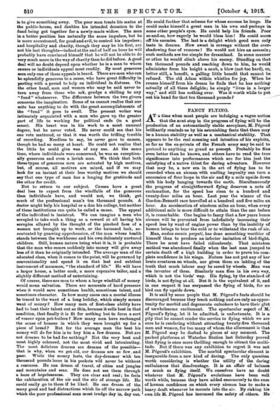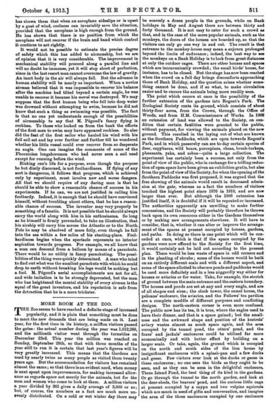FANCY FLYING-.
ATa time when most people are indulging a vague notion that the next step in the progress of flying will be the production of an automatically stable aeroplane, M. Pegoud brilliantly reminds us by his astonishing feats that there may be a human stability as well as a mechanical stability. That appears to be the real meaning and intention of his exploits, so far as the ex-private of the French army may be said to pretend to anything so grand as precept. Probably he flies even better than he knows, and others have to read the true significance into performances which are for him just the satisfying of a native thirst for daring adventure. However that may be, a new era in the art of flying has to he recorded when an airman with smiling impunity can turn a succession of four loops in the air and fly a mile upside down with his body hanging towards the earth. Simultaneously the progress of straightforward flying deserves a note of exclamation, for the speed has risen to a hundred and twenty-four miles an hour. Last year the winner of the Gordon-Bennett race travelled at a hundred and five miles an hour. An acceleration of nineteen miles an hour, when every additional mile is more difficult to attain than the one before it, is remarkable. One begins to fancy that a few years hence airmen will be prevented from indefinitely increasing their speed less by want of engine power than by the inability of human beings to bear the cold or to withstand the rush of air.
Man, audax 011111la perpeti, has done something worthier of himself than to produce an inferior imitation of bird-flight. There he must have failed ridiculously. That mistaken method was abandoned finally when the last man jumped to certain death off a high building in order to prove his com- plete confidence in his wings. Nature has not put any of her brute creatures on wheels, nor given them an inkling of the truth that much labour may be saved by wheels. Man was the inventor of them. Similarly man flies in his own way, which is not the birds' way. His flying, by the standard of birds, is not flying at all. But it is the equivalent of it, and in one respect it has surpassed the flying of birds, for no bird can fly upside down.
It is said by some people that 13. Pegoud's feats should be discouraged because they teach nothing and are only an oppor- tanity for morbid and degenerate onlookers to have their glut of unwholesome excitement. The spectacular aspect of M. Pegoud's flying, let it be admitted, is unfortunate. It is a pity that he cannot render the service to flying which we are sure he is rendering without attracting twenty-five thousand men and women, for too many of whom the allurement is that M. Pegoud may be dashed to pieces at any moment. The packed platforms at Waterloo Station last Saturday proved that flying is once more thrilling enough to attract the multi- tude. But if there was any exhibition to regret it was not M. Pegoud's exhibition. The morbid spectacular element is inseparable from a new kind of daring. The only question worth considering is whether the utility of the daring outbalances that disadvantage. It is an affair of balance as much as flying itself. We ourselves have no doubt whatever that M. Pegoud's evolutions have been well worth while, because they have added enormously to the sum of human confidence on which every airman has to make a heavy draft whenever he mounts into the air. By risking his own life M. Pegoud has increased the safety of others. He
has shown them that when an aeroplane sideslips or is upset by a gust of wind, coolness can invariably save the situation, provided that the aeroplane is high enough from the ground. He has shown that there is no position from which the aeroplane will not recover if the brain and hand which control it continue to act rightly.
It would not be possible to estimate the precise degree of safety which this has added to airmanship, but we are of opinion that it is very considerable. The improvement in mechanical stability will proceed along a parallel line and will no doubt be immense, yet it will stop short of perfection, since in the last resort man cannot overcome the law of gravity. An inert body in the air will always fall. But the advance in human stability will be nearly as important. When a novice airman believed that it was impossible to recover his balance after the machine had tilted beyond a certain angle, he was unable to recover it because his moral was destroyed. We may suppose that the first human being who fell into deep water was drowned without attempting to swim, because he did not know that such a thing as swimming was possible. The fact is that no one yet understands enough of the possibilities of airmanship to say that M. Pegoud's fancy flying is reckless. To those who looked on from the bank the efforts of the first man to swim may have appeared reckless. So also did the feat of the first sailor who hauled his wind with his full sail set and lay over further and further till he wondered whether his little vessel could ever recover from so desperate au angle. One can imagine the comments of some of the Phoenician longshoremen who had never seen a sail used except for running before the wind.
Risking one's life for a purpose, even though the purpose be but dimly discerned, is not foolhardiness. If flying of any sort is dangerous, it follows that progress, which is achieved only by experiment, must involve new and worse dangers. All that we should require of any daring man is that he should be able to show a reasonable chance of success in his experiments. If he can, we are not justified in calling him foolhardy. Indeed, it is enough that he should have convinced himself, without troubling about others, that he has a reason- able chance of success. The inventor may very properly be something of a fanatic. It is not possible that he should always carry the world along with him in his enthusiasms. So long as he himself is firmly persuaded, to take an illustration, that bis airship will carry him across the Atlantic or to the North. Pole he may be absolved of mere folly, even though he fall into the sea within a few miles of his starting-place. Fool- hardiness begins when the spectacle represents no interior aspiration towards progress. For example, we all know that a man can descend from a balloon by means of a parachute. There would be no utility in fancy parachuting. The possi- bilities of the thing were quickly determined. A man who tried to find out what was the smallest parachute with which he oould drop to earth without breaking his legs would be nothing but a fool. M. Pegoud's aerial accomplishments are not for all, and wide imitation is to be strongly deprecated, but the man who has heightened the mental stability of every airman is the equal of the great inventors, and his reputation is safe from the detraction that he is a mere trickster.



































































 Previous page
Previous page